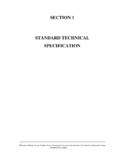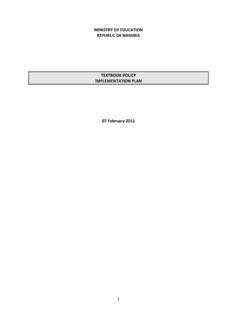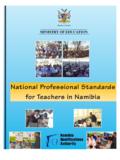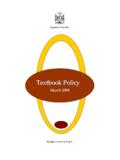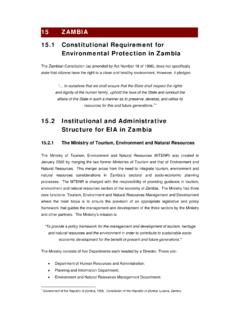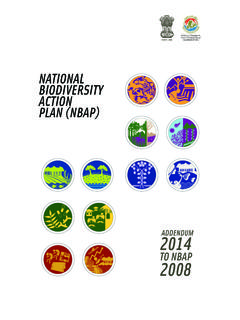Transcription of MINISTRY OF ENVIRONMENT AND TOURISM - …
1 REPUBLIC OF NAMIBIA. MINISTRY OF ENVIRONMENT AND TOURISM . NATIONAL POLICY FOR THE. PROVISION OF HOUSING IN. PROTECTED AREAS. November 2010. i FOREWORD. The MINISTRY of ENVIRONMENT and TOURISM (MET) was established in 1990. It is responsible for the safeguarding and wise use of Namibia's natural resources as well as the facilitation and coordination of TOURISM development in Namibia. In line with this responsibility, the mission of the MINISTRY is to promote biodiversity conservation in the Namibian ENVIRONMENT through the sustainable utilization of natural resources and TOURISM development for the maximum social and economic benefit of its citizens. As the custodian of our natural ENVIRONMENT , the MINISTRY of ENVIRONMENT and TOURISM will lead the sustainable development process towards the achievement of the goals of Vision 2030.
2 In accordance with this mission and the goals of Vision 2030, a great challenge in the planning, development and management of protected areas is to ensure sustainability by minimizing the negative environmental impacts of human activity and infrastructure development. Of particular importance in this regard is the challenge of governing the number, location and standard of staff houses provided within protected areas as well as the number, activities and conduct of the people residing therein. A prerequisite for meeting this challenge is to have in place an innovative policy and regulatory framework. This policy document has thus been formulated to provide such a framework. In its formulation, cognizance has also been taken of other MINISTRY policies, commitments and challenges beyond just those concerned with environmental conservation and TOURISM .
3 Foremost in this regard, consideration has been given to the MINISTRY 's commitment to maintaining a safe and healthy ENVIRONMENT for all employees. In the case of protected areas, this commitment is extended to family members who reside with employees in such areas. Fundamental to this commitment is the recognition that the well being, stability and integrity of family life is an essential building block of our social and economic development. In the current social ENVIRONMENT , family life stability is as an essential element to have in place for meeting the immense challenge of combating the further spread of HIV and AIDS. While the primary purpose of this policy is to rationalise and regulate the provision of housing for MINISTRY employees in Protected Areas, it also provides guidelines and procedures for dealing with other Ministries and organisations that for legitimate reasons may need to house their employees in Namibia's Protected Areas.
4 I therefore urge the leaders, management and relevant members of such Ministries and organisations, as well as the management and relevant staff of the MINISTRY , to take ownership of this policy. In so doing it is hoped that they jointly ensure that it is wisely and responsibly implemented in all its spheres for the benefit of conservation, TOURISM and society as a whole. Netumbo Nandi Ndaitwah, MP. MINISTER. ii PREFACE. TOURISM is a major growth sector in the Namibian economy and protected areas are of strategic importance to the TOURISM sector and the Namibian economy as a whole. Consequently, for Namibian Wildlife Resorts and others operating within our Protected Areas (PAs) to compete effectively with wildlife TOURISM destinations elsewhere in Africa, it is essential that visitors to our PAs are provided with a pristine, tranquil and safe ENVIRONMENT .
5 A prerequisite to maintaining an ENVIRONMENT of this nature in PAs is to limit and manage the number, activities and conduct of people visiting, overnighting and/or residing permanently in these areas. In this regard, the housing and other infrastructure required for accommodating and otherwise meeting the needs of such people also needs be limited, managed and carefully planned. This applies particularly to staff and other people residing permanently in our PAs and, most especially, when their housing is situated closely adjacent to TOURISM resorts or lodges. In recognition of all the above, this policy is intended to regulate all matters relating to the housing of staff in protected area with the dual intention of: Reducing the potential negative impacts on conservation and TOURISM on the one hand; and Providing acceptable living standards and other social conditions for staff on the other.
6 To this end, the policy document contains guidelines, procedures, regulations and conditions relating to the development, maintenance, allocation and occupancy of staff housing in protected areas. It also addresses the rights, obligations and required conduct of the various stakeholders as well as the institutional framework for policy implementation and the monitoring and evaluation of this. Dr Kalumbi Shangula Permanent Secretary iii ABBREVIATIONS/ ACRONYMS. AIDS Acquired Immune-Deficiency Syndrome EIA Environmental Impact Assessment EMP Environmental Management Plan ENP Etosha National Park GRN Government of the Republic of Namibia HQ Head Office of MINISTRY of ENVIRONMENT and TOURISM HIV Human Immune-deficiency Virus MET MINISTRY of ENVIRONMENT and TOURISM MTEF Medium Term Expenditure Framework M&E Monitoring and Evaluation NDP National Development Plan NWR Namibia Wildlife Resorts PA Protected Area iv Contents FOREWORD.
7 Ii PREFACE .. iii ABBREVIATIONS/ iv 1. INTRODUCTION/BACKGROUND .. 1. 2. POLICY FRAMEWORK .. 1. Aim ..1. Policy Principles .. 2. 2. Strategies .. 2. Financing Housing Development .. 2. Housing Development Guidelines .. 3. Eligibility for Residing in PAs .. 3. Authority to Occupy .. 4. Conditions of Occupation .. 4. Housing Categories .. 6. Allocation of Housing .. 6. Housing Obligations .. 7. 3. INSTITUTIONAL FRAMEWORK FOR IMPLEMENTATION .. 9. The Office of the Minister .. 9. Office of the Permanent Secretary .. 10. Directorates within the 11. Regional and PA Level .. 11. 4. MONITORING AND 11. 5. POLICY REVIEW .. 12. BIBLIOGRAPHY .. 13. GLOSSARY OF TERMS .. 14. Annex 1:Code of Conduct Applicable to Persons Provided with Housing in PAs Annex Framework for Providing Incentives and Applying Sanctions Annex Agreement v 1.
8 INTRODUCTION/BACKGROUND. The mission of the MINISTRY is to promote biodiversity conservation in the Namibian ENVIRONMENT through the sustainable utilization of natural resources and TOURISM development for the maximum social and economic benefit of its citizens. As the custodian of our natural ENVIRONMENT , the MINISTRY of ENVIRONMENT and TOURISM will lead the sustainable development process towards the achievement of the goals of Vision 2030. In this vision, TOURISM has been identified as a major growth sector in the Namibian economy and, to ensure sustainability, environmental conservation has also been given a high ranking. Accordingly, PAs are of great strategic importance in the realization of both the conservation and TOURISM goals of Vision 2030.
9 And, for TOURISM in PAs to compete effectively with wildlife TOURISM destinations elsewhere, the product on offer must be of the highest quality possible. This demands, first and foremost, the provision of a pristine, tranquil, safe and secure ENVIRONMENT . Thus, to meet its Vision 2030 obligations, MET is faced with the challenge of developing innovative policies and plans for dealing with the complexities involved in reconciling the dual cross cutting goals of TOURISM and conservation in the context of PAs. Adding to these complexities is the need to provide sufficient housing and supporting infrastructure to satisfy the residential requirements of MET employees based in PAs. Lessons learnt from elsewhere indicate that without reconciling policies and plans, the following negative impacts may arise.
10 A mushrooming of unsightly buildings or the unsightly consequence of building maintenance neglect Overextending the designed capacity of waste disposal infrastructure as well as other bulk services such as water and power Noise pollution from resident staff and their families and friends The spread of alien plants and animals arising from household gardens and pets Health and other social problems including the spread of HIV/AIDs While this policy deals specifically with provision of housing for MET employees in PAs, due regard has been given in its drafting to the following umbrella policies, codes and acts: The Housing Policy of the MINISTRY of Works and Transport Chapter (Housing) of The Public Service Staff Code Part E (Accommodation), Section 28 of the Labour Act (Act No.)
